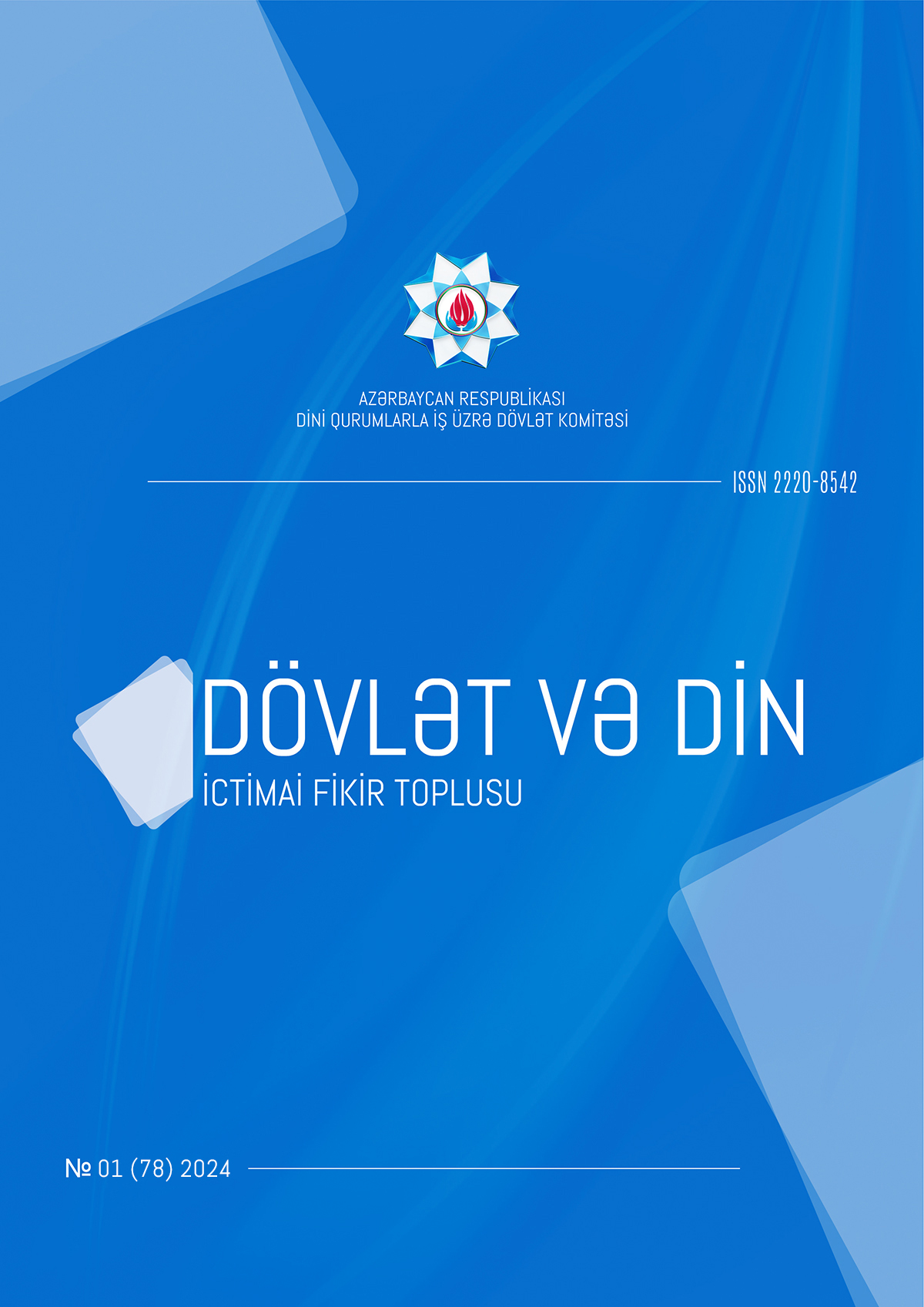ERNEST GELLNERİN STRUKTURAL İSLAM TƏHLİLİNDƏ PRE-MODERN İSLAM MODELİ
Bahlul Aliyev | bahlulaliev@bk.ru
Türkiye Cumhuriyeti İstanbul Gelişim ÜniversitesiAraşdırma
XÜLASƏ
Məqalədə məşhur Britaniya alimi Ernest Andre Gellnerin İslam sosiologiyasına və İslam antropologiyasına əhəmiyyətli tövhə verən İslam tədqiqatlarını, ələlxüsus, struktural şəkildə qurduğu pre-modern İslam modeli tədqiq edilmişdir. Ernest Gellner hər nə qədər millətçilik mövzusunda tədqiqatları ilə ön plana çıxsa da, onun struktural İslam üzərində araşdırmaları pre-modern müsəlman cəmiyyətlərini anlama ilə birlikdə, İslamın daxili dinamikasını ortaya çıxartmaqla müxtəlif cəmiyyətləri analiz etmə imkanı da verməktədir. Tarixi xronologiyaya paralel olaraq mütəmadi dəyişikliklərə məruz qalan və hər formasiyada davranış formalarında fərqliliklə müşahidə olunan İslam cəmiyyətlərini sosioloji perspektivdən anlamaq və analiz edə bilmək üçün bu modelin dəfələrlə yoxlanılması və bu günə qədər də istifadə olunması, sözü gedən modelin sosiologiyada əhəmiyyətini itirmədiyini göstərir
ƏDƏBİYYAT
- David Shankland. “Gellner and Islam” // Social Evolution & History, c. 2, sy.2, Eylül (2003), s. 118-142.
- Ernest Gellner. Plough, Sword and Book. Londra: Collins Harvell, 1988.
- Roland Dannreuther and James Kennedy. “The International Relations of The “Transition”: Ernest Gellner’s Social Philosophy and Political Sociology” // International Political Sociology, c.1, sy.4 (2007), s. 339-357.
- Sami Zubaida. “Is there a Muslim Society? Ernest Gellner’s Sociology of Islam” // Economy and Society, c. 24, sy. 2, Mayıs (1995), s. 151-188.
- Ernest Gellner. Muslim Society. Cambridge: Cambridge University Press, 2000.
- Michael Lessnoff. Ernest Gellner and Modernity. Cardiff: University of Wales Press, 2002.
- Riaz Hassan. “Sociology of Islam”. Encyclopedia of Sociolgy, ed. Edgar F. Borgotta and Rhinda J.V. Montgomery. New York: 2006, 2. Baskı, 5. Cilt.
- Elisabeth Özdalga. “Türkiye’de İslami Uyanış ve Radikalleşme Üzerine” // İslami Araştırmalar Dergisi, c.4, sy.1, Ocak (1990), s. 57-60.
- Ernest Gellner. “Prişestvie Natsionalizma. Mifı Natsii i Klassa” (Rusça’ya çev. M.B. Gnezdovski) // Put: Mejdunarodnıy Filosofskiy Jurnal, (1992), s. 9-61.
- Ernest Gellner. Postmodernism, Reason And Religion. Londra: Routledge, 1992.
ERNEST GELLNERİN STRUKTURAL İSLAM TƏHLİLİNDƏ PRE-MODERN İSLAM MODELİ
Bahlul Aliyev | bahlulaliev@bk.ru
Türkiye Cumhuriyeti İstanbul Gelişim ÜniversitesiResearch
SUMMARY
In this study, it is aimed to examine the Islamic studies, especially the pre-modern Islam model developed by the famous British scientist Ernest Andre Gellner, which has made a very important contribution to Islamic Sociology and Islamic Anthropology. Although Ernest Gellner stands out with his research on nationalism, his studies on Islam offer the opportunity to understand pre-modern Muslim societies as well as the internal dynamics of Islam and to interpret different societies. The repeated testing of the model for sociological understanding and analysis of Islamic societies, which have undergone constant changes in parallel with historical developments and differ in their behavior patterns in every formation, and its use even today shows that it has not lost its sociological importance
REFERENCE LIST
- David Shankland. “Gellner and Islam” // Social Evolution & History, c. 2, sy.2, Eylül (2003), s. 118-142.
- Ernest Gellner. Plough, Sword and Book. Londra: Collins Harvell, 1988.
- Roland Dannreuther and James Kennedy. “The International Relations of The “Transition”: Ernest Gellner’s Social Philosophy and Political Sociology” // International Political Sociology, c.1, sy.4 (2007), s. 339-357.
- Sami Zubaida. “Is there a Muslim Society? Ernest Gellner’s Sociology of Islam” // Economy and Society, c. 24, sy. 2, Mayıs (1995), s. 151-188.
- Ernest Gellner. Muslim Society. Cambridge: Cambridge University Press, 2000.
- Michael Lessnoff. Ernest Gellner and Modernity. Cardiff: University of Wales Press, 2002.
- Riaz Hassan. “Sociology of Islam”. Encyclopedia of Sociolgy, ed. Edgar F. Borgotta and Rhinda J.V. Montgomery. New York: 2006, 2. Baskı, 5. Cilt.
- Elisabeth Özdalga. “Türkiye’de İslami Uyanış ve Radikalleşme Üzerine” // İslami Araştırmalar Dergisi, c.4, sy.1, Ocak (1990), s. 57-60.
- Ernest Gellner. “Prişestvie Natsionalizma. Mifı Natsii i Klassa” (Rusça’ya çev. M.B. Gnezdovski) // Put: Mejdunarodnıy Filosofskiy Jurnal, (1992), s. 9-61.
- Ernest Gellner. Postmodernism, Reason And Religion. Londra: Routledge, 1992.
Bahlul Aliyev | bahlulaliev@bk.ru
Türkiye Cumhuriyeti İstanbul Gelişim ÜniversitesiИсследование
ЛИТЕРАТУРА
- David Shankland. “Gellner and Islam” // Social Evolution & History, c. 2, sy.2, Eylül (2003), s. 118-142.
- Ernest Gellner. Plough, Sword and Book. Londra: Collins Harvell, 1988.
- Roland Dannreuther and James Kennedy. “The International Relations of The “Transition”: Ernest Gellner’s Social Philosophy and Political Sociology” // International Political Sociology, c.1, sy.4 (2007), s. 339-357.
- Sami Zubaida. “Is there a Muslim Society? Ernest Gellner’s Sociology of Islam” // Economy and Society, c. 24, sy. 2, Mayıs (1995), s. 151-188.
- Ernest Gellner. Muslim Society. Cambridge: Cambridge University Press, 2000.
- Michael Lessnoff. Ernest Gellner and Modernity. Cardiff: University of Wales Press, 2002.
- Riaz Hassan. “Sociology of Islam”. Encyclopedia of Sociolgy, ed. Edgar F. Borgotta and Rhinda J.V. Montgomery. New York: 2006, 2. Baskı, 5. Cilt.
- Elisabeth Özdalga. “Türkiye’de İslami Uyanış ve Radikalleşme Üzerine” // İslami Araştırmalar Dergisi, c.4, sy.1, Ocak (1990), s. 57-60.
- Ernest Gellner. “Prişestvie Natsionalizma. Mifı Natsii i Klassa” (Rusça’ya çev. M.B. Gnezdovski) // Put: Mejdunarodnıy Filosofskiy Jurnal, (1992), s. 9-61.
- Ernest Gellner. Postmodernism, Reason And Religion. Londra: Routledge, 1992.




